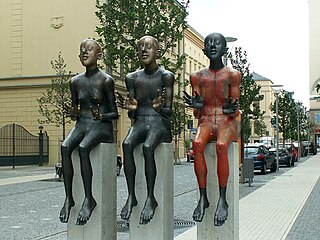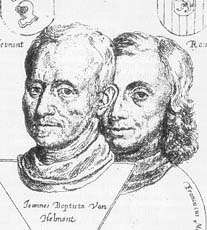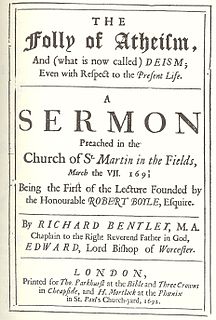
John Locke was an English philosopher and physician, widely regarded as one of the most influential of Enlightenment thinkers and commonly known as the "Father of Liberalism". Considered one of the first of the British empiricists, following the tradition of Sir Francis Bacon, Locke is equally important to social contract theory. His work greatly affected the development of epistemology and political philosophy. His writings influenced Voltaire and Jean-Jacques Rousseau, and many Scottish Enlightenment thinkers, as well as the American Revolutionaries. His contributions to classical republicanism and liberal theory are reflected in the United States Declaration of Independence. Internationally, Locke’s political-legal principles continue to have a profound influence on the theory and practice of limited representative government and the protection of basic rights and freedoms under the rule of law.

The Age of Enlightenment was an intellectual and philosophical movement that dominated the world of ideas in Europe during the 17th and 18th centuries. The Enlightenment included a range of ideas centered on the pursuit of happiness, sovereignty of reason, and the evidence of the senses as the primary sources of knowledge and advanced ideals such as liberty, progress, toleration, fraternity, constitutional government, and separation of church and state.

Religious toleration may signify "no more than forbearance and the permission given by the adherents of a dominant religion for other religions to exist, even though the latter are looked on with disapproval as inferior, mistaken, or harmful". Historically, most incidents and writings pertaining to toleration involve the status of minority and dissenting viewpoints in relation to a dominant state religion. However, religion is also sociological, and the practice of toleration has always had a political aspect as well.

Toleration is the allowing, permitting, or acceptance of an action, idea, object, or person which one dislikes or disagrees with. Political scientist Andrew R. Murphy explains that "We can improve our understanding by defining "toleration" as a set of social or political practices and "tolerance" as a set of attitudes.". Random House Dictionary defines tolerance as "a fair, objective, and permissive attitude toward those whose opinions, beliefs, practices, racial or ethnic origins, etc., differ from one's own".

Early modern philosophy is a period in the history of philosophy at the beginning or overlapping with the period known as modern philosophy.

A Letter Concerning Toleration by John Locke was originally published in 1689. Its initial publication was in Latin, and it was immediately translated into other languages. Locke's work appeared amidst a fear that Catholicism might be taking over England, and responds to the problem of religion and government by proposing religious toleration as the answer. This "letter" is addressed to an anonymous "Honored Sir": this was actually Locke's close friend Philipp van Limborch, who published it without Locke's knowledge.

The American Enlightenment was a period of intellectual ferment in the thirteen American colonies in the 18th to 19th century, which led to the American Revolution, and the creation of the United States of America. The American Enlightenment was influenced by the 17th-century European Enlightenment and its own native American philosophy. According to James MacGregor Burns, the spirit of the American Enlightenment was to give Enlightenment ideals a practical, useful form in the life of the nation and its people.

Edward Stillingfleet was a British Christian theologian and scholar. Considered an outstanding preacher as well as a strong polemical writer defending Anglicanism, Stillingfleet was known as "the beauty of holiness" for his good looks in the pulpit, and was called by John Hough "the ablest man of his time".
John Greville Agard Pocock is a historian of political thought from New Zealand. He is especially known for his studies of republicanism in the early modern period, his work on the history of English common law, his treatment of Edward Gibbon and other Enlightenment historians, and, in historical method, for his contributions to the history of political discourse.
Perez Zagorin was an American historian who specialized in 16th- and 17th-century English and British history and political thought, early modern European history, and related areas in literature and philosophy. From 1965 to 1990, he taught at the University of Rochester, New York, retiring as the Joseph C. Wilson Professor of History Emeritus.

Franciscus Mercurius van Helmont was a Flemish alchemist and writer, the son of Jan Baptist van Helmont. He is now best known for his publication in the 1640s of his father's pioneer works on chemistry, which link the origins of the science to the study of alchemy.
Margaret J. "Maggie" Osler was a historian and philosopher of early modern science and a Professor of History at the University of Calgary.
Jonas Proast (c.1640−1710) was an English High Church Anglican clergyman and academic. He was an opponent of latitudinarianism, associated with Henry Dodwell, George Hickes, Thomas Hearne and John Edwards. He is now known for his controversy with John Locke, over Locke's Letter concerning Toleration.
Stephen Nye (1648–1719) was an English clergyman, known as a theological writer and for his Unitarian views.

Atheism, as defined by the entry in Diderot and d'Alembert's Encyclopédie, is "the opinion of those who deny the existence of a God in the world. The simple ignorance of God doesn't constitute atheism. To be charged with the odious title of atheism one must have the notion of God and reject it." In the period of the Enlightenment, avowed and open atheism was made possible by the advance of religious toleration, but was also far from encouraged.
Daniel Cawdry (Cawdrey) (1588–1664) was an English clergyman, member of the Westminster Assembly, and ejected minister of 1662.

The 1668 Bawdy House Riots took place in 17th-century London over several days in March during Easter Week, 1668. They were sparked by Dissenters who resented the King's proclamation against conventicles while turning a blind eye to the equally illegal brothels. Thousands of young men besieged and demolished brothels throughout the East End, assaulting the prostitutes and looting the properties. As the historian Tim Harris describes it:
"The riots broke out on Easter Monday, 23 March 1668, when a group attacked bawdy houses in Poplar. The next day crowds of about 500 pulled down similar establishments in Moorfields, East Smithfield, St Leonard's, Shoreditch, and also St Andrew's, Holborn, the main bawdy house districts of London. The final assaults came on Wednesday, mainly in the Moorfields area, one report claiming there were now 40,000 rioters - surely an exaggeration, but indicating that abnormally large numbers of people were involved. ... On all days the crowds were supposedly armed with 'iron bars, polaxes, long staves, and other weapons', presumably the sort of tools necessary for house demolition. The rioters organized themselves into regiments, headed by a captain, and marching behind colours."
Richard Ashcraft was an American political theorist and Professor of Political Science at UCLA.
Mark Goldie is an English historian and Professor of Intellectual History at Churchill College, Cambridge. He has written on the English political theorist John Locke and is a member of the Early Modern History and Political Thought and Intellectual History subject groups at the Faculty of History in Cambridge.

Paul Chang-Ha Lim an American ecclesiastical historian who serves as professor of church history at Vanderbilt University Divinity School. His main research involves the intellectual history and historical theology of Reformation and post-Reformation England.